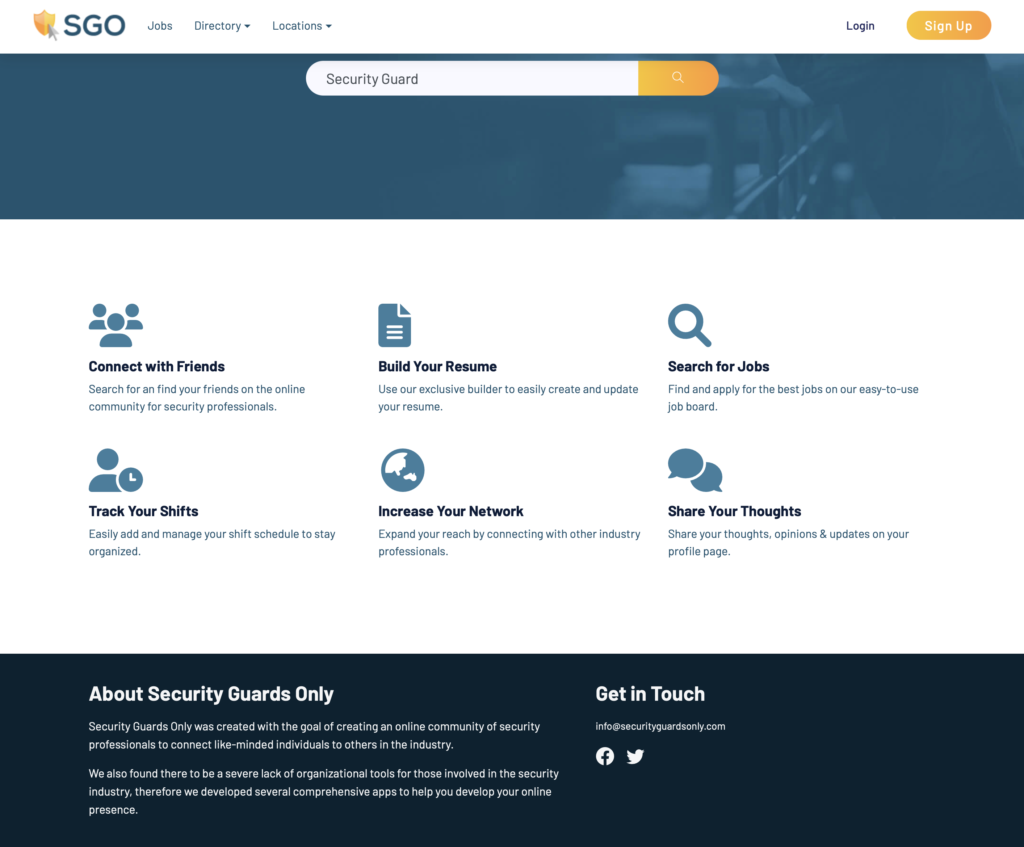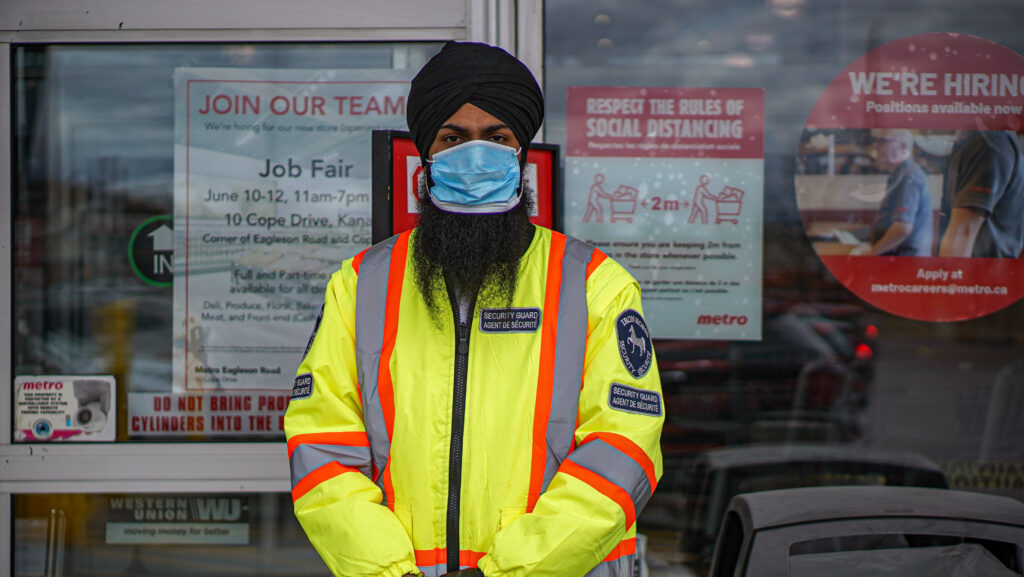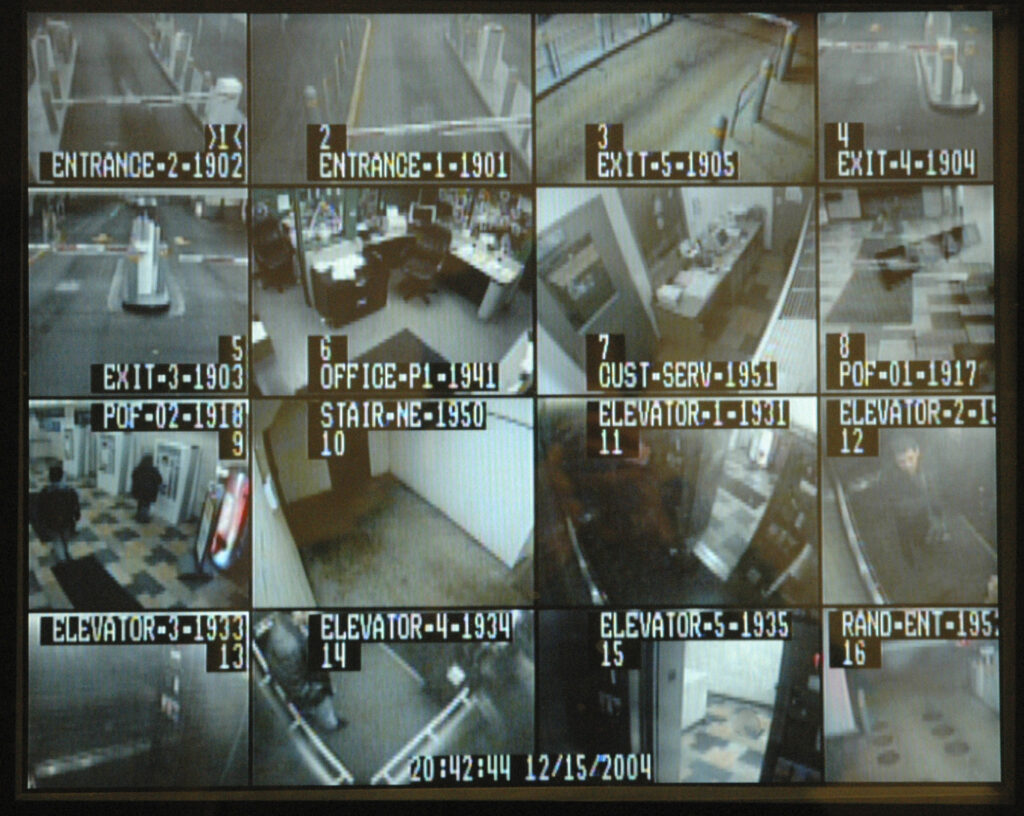A place for Security Guards to Grow, ONLINE

There’s no doubt that the security industry is becoming more professional than ever before. In contrast, the wages and compensation don’t reflect it. The reality is clients are demanding more qualified guards despite paying lower wages.
Some gems are out there, so keep your eyes and ears open. When you’re looking to move from a low-skilled job client to a higher-skilled one with loftier pay and better hours, the first question is always, where is your résumé?
Of course, as a security guard, résumés are the last thing we consider. Getting a job as a security guard often doesn’t require a résumé, but just walking into an agency office asking the HR personnel for an application form.
So, creating one from scratch can be challenging when the big ask comes for your curriculum vitae. Security Guards Only Dot Com (www.securityguardsonly.com) has it figured out for you.
SGO is a website created for professionals that provides the tools security guards need. They’ve created an easy, fill-in-the-blanks form, which makes it easy to build the perfect résumé. Even to search and apply for new jobs.
It’s free, just like access to thousands of job postings and other security guard-related knowledge. You should sign up today.
Addressing the Misconceptions: The True State of the Security Industry and Government’s Limited Commitment to Security

In light of recent events and concerns raised regarding the security industry and the allocation of resources by the Government, we feel it is necessary to clarify the current situation and dispel misconceptions.
Contrary to what may be portrayed in the news, there is a greater demand for security services than available workers. The security industry will experience significant growth in the coming years, particularly in the private sector.
The Security Industry’s Impending Boom
With emerging challenges and increased security needs, the industry is on the cusp of a significant boom. The Government has recognized the importance of protecting religious places and has allocated funds to ensure the safety of these sacred spaces. Furthermore, budget cuts in policing have led to a greater reliance on private security services to maintain public safety. The rise in private property ownership also necessitates enhanced security measures, resulting in a growing demand for professional security personnel.
Government’s Commitment to Security
Contrary to popular belief, the Government acknowledges the significance of security in safeguarding both public and private interests. It is important to note that the Government’s financial support for protecting personal property does not diminish its commitment to public safety or undervalue the security industry’s contributions. The allocation of resources to protect private property aligns with the evolving landscape and changing security needs.
Industry Challenges and Government Procurement
The security industry operates within a narrow profit margin, facing various challenges that impact its sustainability. Recent events, such as the bankruptcy of Neptune Security, highlight the delicate balance that security agencies must sustain. The repercussions of these events have disrupted security services and have necessitated quick adaptation efforts within the industry.
Perplexingly, the Government’s decision to engage smaller security agencies to fill the void left by the bankruptcy of a medium-sized agency raises concerns. Bureaucrats using price as the deciding factor show the Government intends to ensure uninterrupted security services but following the same model that already failed—doing the same thing over and over again and expecting a different result, proving yet another one of Einstein’s theories.
Government’s Commitment to Politician Safety
Ensuring the protection of politicians has recently become of utmost importance. It will be interesting to see how those jobs are awarded; we think it is safe to suggest they will not be tendered to the lowest bidder. Those jobs will likely go to highly paid public police officers so they can be armed. While the Politicians will enjoy armed guards, the rest of Canadians will be protected by low-bidding agencies, lightly trained security guards only allowed to carry firearms to protect property. That’s right, in Canada, Guards can only carry guns to protect property, not people.
Government’s Commitment to Public Safety
The current private security model remains vastly under-regulated. While guards must take a forty-hour training course and have first aid certificates, that is pretty much the extent of the process. Even the low standard of an absence of significant criminality is barely a reliable litmus test to determine who should watch over our families in the local mall. When Pierre Poilievre gets his new security detail, his security will be heavily regulated, trained and highly paid. Perhaps the rest of the public should enjoy some of that too. A higher-paid, professional security guard to make sure they are safe in their office towers, condominiums and shopping centres. Perhaps it is time for a higher mandated wage for security; alternatively, Mr. Poilievre should get the same guard as the rest of us have watching over our safety.
The Dichotomy of Security Guards: Reflections on Industry Practices and Oversight.

When conducting a Google search on security guards, one is confronted with a mixed bag of stories. While a few tales of heroism and exemplary service can be found, most seem to revolve around security guards running amuck. This raises the question of whether these stories indicate an industry plagued by low wages fueled by profit-driven clients seeking the cheapest security options or if they point to a lack of regulation and oversight by industry leaders and government regulators. In exploring this issue, it becomes evident that both factors contribute to the prevailing narrative surrounding security guards.
Low Wages and Client Demands
Like any other, the security industry is not immune to market forces’ influence. Clients seeking security services often prioritize cost over quality, leading to a demand for low-cost security solutions. Consequently, security companies, to secure contracts, may resort to reducing wages to offer competitive rates. The repercussions of such practices can be far-reaching:
- Inadequate Training: Lower wages can limit the ability of security companies to invest in comprehensive training programs for their guards. This lack of training can result in ill-equipped guards to handle the diverse challenges they may face.
- Employee Turnover: Low wages can lead to high turnover rates, as guards seek better-paying opportunities elsewhere. This constant turnover can disrupt the continuity and effectiveness of security operations.
- Disgruntled Employees: Low wages can breed dissatisfaction among security guards, potentially leading to apathy, lack of motivation, or even misconduct on the job.
Lack of Regulation and Oversight:
While client demands and low wages contribute to the challenges faced by the security industry, a lack of regulation and oversight exacerbates the situation. Insufficient guidelines and standards for training, qualifications, and working conditions can result in subpar practices:
- Minimal Entry Barriers: The absence of stringent requirements to become a security guard can lead to a workforce with varying levels of competency and professionalism. Without proper regulation, anyone can become a security guard, regardless of their suitability for the role.
- Inconsistent Monitoring: Without robust oversight by industry leaders and government regulators, enforcing standards and protocols within the security industry becomes inconsistent. This lack of accountability may allow unscrupulous individuals or companies to operate without consequences, tarnishing the industry’s reputation as a whole.
- Ethical Dilemmas: Without clear guidelines can put security guards in ethically challenging situations. Without proper regulation, guards may face conflicting expectations, making it difficult for them to navigate complex scenarios while upholding ethical standards.
The negative stories dominating search results on security guards can be attributed to a combination of factors rather than a single cause. While the pursuit of cost-efficiency by clients and the resulting low wages play a role, the industry’s lack of regulation and oversight also contributes significantly. It is crucial to recognize that solutions to these issues require a multifaceted approach:
- Collaboration between Industry and Government: Industry leaders and government regulators must work together to establish and enforce standards for training, qualifications, and working conditions within the security industry.
- Investment in Training and Professional Development: Security companies should prioritize their guards’ comprehensive training and ongoing professional development, ensuring they possess the skills and knowledge necessary to handle various situations.
- Client Awareness and Education: Clients should be encouraged to prioritize quality over cost when selecting security services, understanding the importance of investing in well-trained and adequately compensated guards.
By addressing both the economic and regulatory aspects, it is possible to create an environment where security guards are better equipped, professionally fulfilled, and capable of delivering the highest standard of service. This, in turn, will reshape the narrative surrounding security guards and elevate the industry as a whole.
Jeff Ketelaars
Co-Founder of
www.securityguardsonly.com
